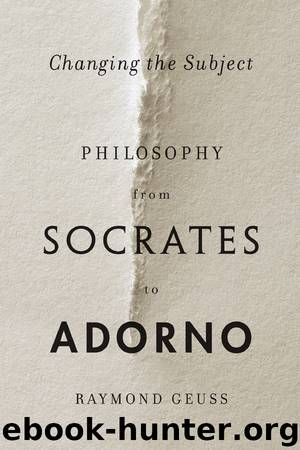Changing the Subject: Philosophy From Socrates to Adorno by Raymond Geuss

Author:Raymond Geuss
Language: eng
Format: epub
Tags: Philosophy, History & Surveys, General, Political, Religious, Movements, Individual Philosophers
Publisher: Harvard University Press
Published: 2017-10-23T00:00:00+00:00
This does not mean that Spirit is something like a metaphysical group mind, but it is a theoretical way of describing certain human phenomena which do not lend themselves either to analysis in terms merely of individual psychology or to analysis in terms simply of the properties of groups. A good example of a spiritual phenomenon is a language, or in fact anything that at all depends on language. A language such as English or Turkish exists only as a collective social entity activated by individuals: ‘I’ speak this way to a large extent because ‘we’ speak this way (and vice versa). It is true that English would not exist if there had never been individual speakers who made use of it, but it is also true that the language preexists any individual speaker; every speaker finds it always already there. There is no path either from universal structures of rationality or from my individual consciousness and actions to a full understanding of the language as a social phenomenon. Universal structures won’t explain the difference between English and Turkish, and no amount of introspection of the consciousness of any individual will give you a grasp of vocabulary items in the language which that individual does not happen (at some time) to know. In addition, you cannot understand me as an individual without understanding my beliefs, but they will be formulated in a language which is not (finally) my own individual creation, but a social phenomenon; that is, you can understand me only as a form of spirit, as an individuated part of an ‘us’. Finally, ‘I’ can’t understand myself except as part of a ‘we’ which I can alternately identify with and distinguish myself from. So in a sense even self-understanding is a ‘spiritual’ phenomenon.
The second property of Spirit is also unorthodox:
2. Spirit is a (social) formation that is always in the process of aspiring to making itself into (a better version of) itself. Hegel says again and again Spirit ‘is’ not anything; it is always ‘becoming’ something or rather ‘making itself into something’.
Download
This site does not store any files on its server. We only index and link to content provided by other sites. Please contact the content providers to delete copyright contents if any and email us, we'll remove relevant links or contents immediately.
The remains of the day by Kazuo Ishiguro(8975)
Tools of Titans by Timothy Ferriss(8365)
Giovanni's Room by James Baldwin(7329)
The Black Swan by Nassim Nicholas Taleb(7107)
Inner Engineering: A Yogi's Guide to Joy by Sadhguru(6785)
The Way of Zen by Alan W. Watts(6601)
Asking the Right Questions: A Guide to Critical Thinking by M. Neil Browne & Stuart M. Keeley(5759)
The Power of Now: A Guide to Spiritual Enlightenment by Eckhart Tolle(5754)
The Six Wives Of Henry VIII (WOMEN IN HISTORY) by Fraser Antonia(5498)
Astrophysics for People in a Hurry by Neil DeGrasse Tyson(5182)
Housekeeping by Marilynne Robinson(4436)
12 Rules for Life by Jordan B. Peterson(4299)
Double Down (Diary of a Wimpy Kid Book 11) by Jeff Kinney(4261)
Ikigai by Héctor García & Francesc Miralles(4246)
The Ethical Slut by Janet W. Hardy(4242)
Skin in the Game by Nassim Nicholas Taleb(4239)
The Art of Happiness by The Dalai Lama(4125)
Skin in the Game: Hidden Asymmetries in Daily Life by Nassim Nicholas Taleb(3991)
Walking by Henry David Thoreau(3953)
